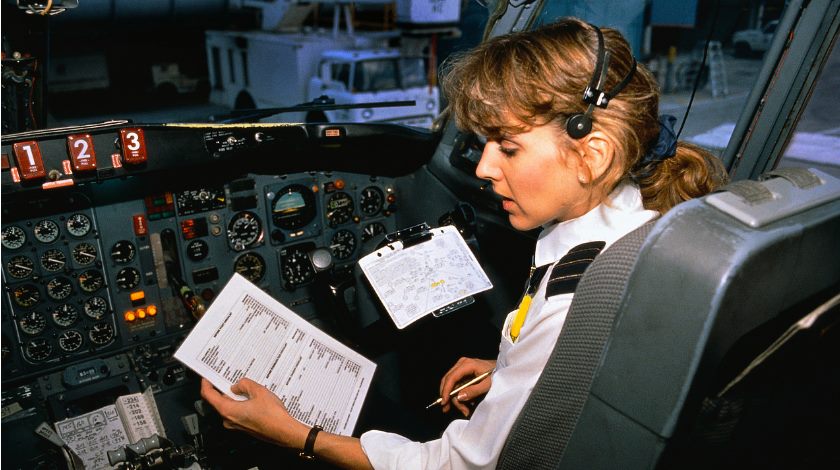Photo: airgeorgian.ca
Reading Time: 3 minutesGetting your first professional pilot job is something that’s hard to describe. Anyone who has put the effort in getting their ATPL qualification is going to be thrilled to be finally working as an airline pilot. For many, the road will have been long and sometimes both emotionally and physically exhausting. When you finally get it… oh boy, you feel like you just have conquered the world and you’ll finally be able to relax, right? Not really. Yes, you’ve undoubtedly achieved something already, but you’re entering a whole new world when opening the door to your first airline job.
So what’s important to remember when setting off on the right foot in the pilot career you’ve always dreamed of? In this article, BAA Training offers its (sometimes tongue-in-cheek) advice to new pilots, highlighting the pitfalls that they have known *some* new pilots to fall into.
Watch the attitude
An issue that airlines sometimes encounter with new pilots is attitude. Yes, you’ve done well, you finished your studies, the airline has chosen YOU to join their team, but you still have so much more to learn. Even though your previous experience and knowledge is undoubtedly valuable and has brought you to this point, you start at the airline with a blank sheet of paper. So act like it. Try to learn from your superiors, pay attention to everything that is happening around you and do that respectfully. There’s no doubt that gaining your first 500 flight hours is your main goal. But even if you’ve joined your first airline thinking it’s only to get hours, and you have every intention of moving on to a bigger or ‘better’ airline as soon as you can, that doesn’t mean you need to mention that fact to your colleagues. Rather than have the attitude of ‘What you can give to me,’ try to adopt the stance, ‘How can I help you.’ Soak in all the information you can and aim to be a great pilot.
Hold your horses!
There is no doubt that when entering the airline your main goal will be to gain experience and flight hours. Unfortunately, some new pilots can focus entirely on this one thing, forgetting that being a pilot means much more. Just like working in any kind of organisation or any kind of job, you first need to learn to work as part of the airline team, so do not forget your CRM and MCC skills. There are so many organisational responsibilities, like following certain aircraft and company procedures, or filling documentation – all responsibilities which need to be taken seriously. “Some pilots can forget about studying, about organising papers, forget about resting,” says Mónica Ferreira, recalling her experience working with flight operations support at White Airways. “The most important thing for them is having their licences in order and being available to fly, wherever it may be. They’re always ready to operate wherever the company needs them or even to change to a different company if the number of block hours is superior. Gaining experience is their goal. Performing well and commanding an aircraft is their dream.”
Brush up before you even start
Unfortunately, there are some assumptions around current training standards which don’t do new pilots any favours. Hrvoje Jirousek, Crew Training Post Holder at Limitless Airways, says, “The airlines look more favourably on the applicants who already have a type rating, or have the means to pay for it themselves. That way the selection is, in many cases, limited to the pilots who are financially capable to undergo the training on their own; the rest is often not even considered in the airline’s evaluation process. New pilots are treated as customers who are paying and it’s very rare that they will fail, even if they only meet marginal standard.” It’s important to remember that becoming a pilot doesn’t mean just being able to pay for the studies. Is your training provider making an effort to actually evaluate whether you are suitable for the profession? What criteria are they using to make the assessment? Do they work in partnership with airlines for pilot assessment? These are the important questions that you should think about and get answers to before choosing your training provider for any type rating or further training.
Automation in aviation is also growing, and the ‘older heads’ don’t want to see new pilots just relying on the technology. “The trend in aviation nowadays is to use all gadgets and avoid flying the aircraft manually or skip on using the visual approach (which is essential item in training). This factor has contributed to some fatal accidents in the last few years,” adds Jirousek. While getting your qualification, work hard on SOP and CRM training, pay attention while mastering the art of sharing tasks, understand the automation, and actually be able to fly manually in case of equipment failure.
So if you have just got your first job – congratulations! But don’t miss the chance to start your amazing pilot career on the right foot – you’ll be thankful for it in the future.

